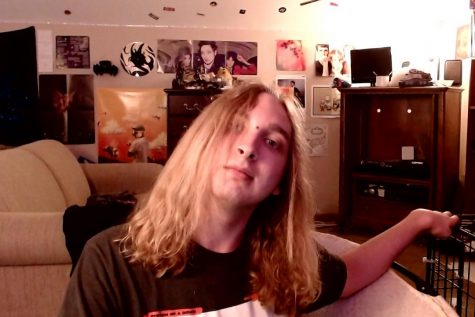Joji Expands His Sound on “Nectar” – Album Review
On his second LP, Joji seems to be drifting away from his former lo-fi aesthetic
September 28, 2020

George Miller, or his stage name, Joji, has, up until his debut album Ballads 1, been hidden in the shadows for a fair amount of time. Having been more known for his YouTube comedy videos, his main audience was focused there. However, upon his resignation from YouTube, that audience has stayed with him, only now through his music. This is most likely what led to the success of Ballads 1 and possibly even his In Tongues EP, in which he established a very lo-fi sound. This would end up being a double-edged sword, however, as this made these projects lack a definitive sound to them. However, the lead single for this album, “Sanctuary”, saw Joji going into a more pop-oriented, high gloss production style.
The possibility of this becoming a new direction for Joji was then reaffirmed by the following three singles, “Run,” “Gimme Love,” and “Daylight.” Each of these tracks had a very similar production style as each other, each with the more shimmery and glossy style to them, but also stayed pretty separate from each other in terms of overall sound. “Gimme Love” is, perhaps, one of the greatest examples of this. The track uses a pulsing synth groove, something we’ve never really seen from him, as in his previous work his instrumentals were incredibly atmospheric, almost to the point of ambience. The song then suddenly switches up around the midpoint, and from here delivers itself almost in a classical fashion. “Run” also may just be one of his best tracks to date, showcasing an instrumental palette almost like that of an 80’s rock ballad, complete with a guitar solo for an outro similar to that of Poppy’s song “Don’t Ask” (an artist who also got their fame off of YouTube content), along with much more matured vocals than we may have ever seen from him up until this point. Additionally, “Daylight,” with a Diplo feature, takes on a much more pop oriented aesthetic, similar to what we saw in “Sanctuary.”
So, going into this album, I was expecting something completely different than we may have ever heard from him. However, this had me more nervous than excited. I was unsure that if, by going this far away from what he had done prior, he would be risking creating something worse simply due to inexperience. And then, when the track listening announcement came, it made these fears worse. Sitting at 18 full length songs, this is a 53-minute behemoth of an album. With so many tracks, it was hard to imagine that all of them would prove to be just as good as it’s singles, while still being just as experimental. However, the opening track, “Ew,” shows that Miller may not be stepping away entirely after all. Despite its incredibly prominent and, honestly, outstanding vocal performance, along with the same production as the other tracks, it still shares many qualities with his debut, but only in the best way possible.
“Tick Tock” (a track that will probably end up on Tik Tok), has perhaps one of the catchiest choruses of the entire album, with an acoustic guitar melody and a soft drum groove. Tracks like these serve as pretty soothing breaks from some of the other more depressing songs on the record, which essentially take up half the album. “NITROUS,” a track that seems like a 2020 take on the Ballads 1 track “CAN’T GET OVER YOU,” is another example of this.
Despite the album not having any true intermissions, the track “Upgrade” takes the place of one. Sitting at only 1:30 in length, it features incredibly jazzy piano and ukulele chords on top of a pulsing drum beat. The switch in style and length makes for an interesting dynamic fairly early in the album.
“Pretty Boy,” a track that was featured on the “NOT SONG” series (a series of YouTube videos with various demos, released alongside the actual singles from the album) is a bit of a low point of the album; it feels almost as though it’s in demo quality, and, despite me not being a fan of his music by any means, Lil Yatchy ends up outperforming Joji on this cut.
The song “Reanimator,” with yet another feature, this time from Yves Tumor, is a primarily instrumental track; with incredibly dark sounding bass chords making up to nearly two-thirds of the entire song. However, this layout suits the song well, and gives it an incredibly atmospheric sound, building up for the final tracks of the album.
“Like You Do” is yet another major highlight for the album, with soft synth melodies leading into a booming chorus, is like the musical equivalent of running around in an abandoned coliseum made out of marble. It is an incredibly surreal and nostalgic track, and is definitely one of the better ones on the album. This track leads into the surprisingly uplifting outro track, “Your Man.” This song sees Joji taking influences seemingly from that of Imagine Dragons’ album Evolve; but where Imagine Dragons comes off as minimalistic, dry, and empty, it instead makes George sound much more lively, and suits his sound much better.
Overall, does this album mean Joji is officially done with his lo-fi sound from his former projects? No. Despite this, he is seemingly no longer afraid to make songs that also have higher production, and has seemingly found a comfortable middle ground between the two for him. If you are a fan of anything pop, R&B, classical, or lo-fi, this album is an absolute must. It showcases some of Joji’s best vocals, production, and instrumentation to date. When compared to his previous work, and even other releases in the genre, this album is a success.


